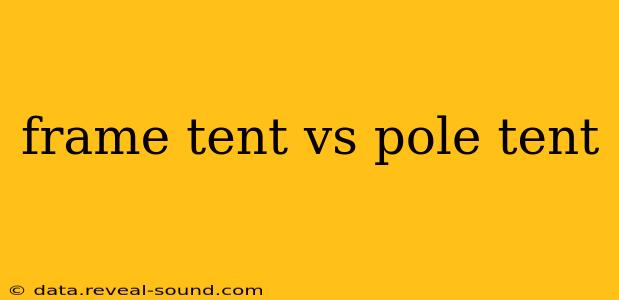Choosing between a frame tent and a pole tent can feel overwhelming. Both offer shelter from the elements, but their designs, setup, and suitability for different events vary significantly. This comprehensive guide will break down the key differences, helping you determine which tent type best fits your specific requirements.
What is a Frame Tent?
Frame tents, also known as "A-frame tents" or sometimes "aluminum frame tents," boast a rigid, self-supporting frame made typically from aluminum or steel. This frame provides exceptional stability and allows for larger, more complex designs. The fabric cover is simply draped over this pre-assembled frame, making setup relatively straightforward (though still requiring some effort, especially for larger sizes).
Pros of Frame Tents:
- Stability: Their rigid frame makes them incredibly stable, even in windy conditions.
- Easier Setup: Generally quicker and easier to erect than pole tents, especially for larger sizes. Many models come with a simple, intuitive system for assembly.
- Versatile Designs: Available in various sizes and shapes, often offering more design flexibility (e.g., peaked roofs, windows, etc.).
- Durable: The robust frame ensures long-term use and resistance to damage.
Cons of Frame Tents:
- Higher Cost: Frame tents are typically more expensive than comparable-sized pole tents.
- Heavier: The rigid frame means they're significantly heavier and bulkier to transport and store.
- Limited Customization: While some designs offer variations, the fundamental structure is less adaptable than pole tents.
What is a Pole Tent?
Pole tents, also called "center-pole tents" or sometimes "traditional tents," utilize center poles and ropes to create a supportive structure. This typically involves staking the tent firmly into the ground, creating a more temporary setup. The tent's fabric is stretched over these poles, often with additional support from side poles or guy ropes.
Pros of Pole Tent:
- Lower Cost: Generally less expensive than frame tents, especially for larger sizes.
- Lighter Weight: Easier to transport and store compared to frame tents.
- High Customization: Offers significant flexibility in size and shape, allowing for more unique designs and configurations.
Cons of Pole Tent:
- More Difficult Setup: Requires more time and expertise to assemble correctly, including staking, guying and proper tensioning of the fabric.
- Less Stable: Prone to instability in windy conditions, requiring careful setup and potentially additional weights.
- Potential for Damage: Improper setup can lead to easier damage to the tent fabric or poles.
Frame Tent vs. Pole Tent: Key Differences Summarized
| Feature | Frame Tent | Pole Tent |
|---|---|---|
| Frame | Rigid, self-supporting | Center pole and guy ropes |
| Stability | Very Stable | Less Stable, wind-dependent |
| Setup | Easier | More Difficult |
| Cost | More Expensive | Less Expensive |
| Weight | Heavier | Lighter |
| Portability | Less Portable | More Portable |
| Customization | Less Customizable | Highly Customizable |
| Durability | Generally More Durable | Potentially Less Durable |
How do I choose between a frame tent and a pole tent?
The best choice depends on your specific needs and priorities. Consider these factors:
- Budget: Pole tents are usually more budget-friendly.
- Event Type: Frame tents are ideal for formal events needing stability, while pole tents suit more informal gatherings.
- Location: Windy locations necessitate a more stable frame tent.
- Setup Time & Skill: Consider your experience and the available help for setup.
- Transport & Storage: Evaluate your capacity to transport and store the chosen tent.
What are the different sizes available for frame and pole tents?
Both frame and pole tents come in a wide range of sizes, from small party tents to massive structures suitable for large events. Size selection depends heavily on the expected number of guests and the desired floor space. Always check the manufacturer's specifications for accurate capacity information.
Which type of tent is better for camping?
For camping, a lightweight and portable pole tent is generally preferred, especially if you're backpacking or hiking. However, if stability in unpredictable weather is paramount, a smaller, more robust frame tent might be a better choice, depending on the terrain and climate.
Which tent is better for long-term use?
Frame tents, due to their robust construction, are typically better suited for long-term or repeated use, while pole tents might require more frequent repairs or replacements.
By carefully considering these factors and weighing the pros and cons of each tent type, you can make an informed decision and choose the perfect tent for your needs. Remember to always prioritize safety and proper setup, regardless of your choice.
